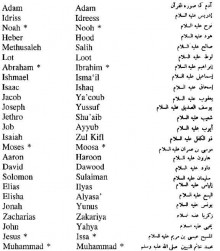Prophets of Allah – Peace be upon Them….
Posted in Daily IslamAugust 30, 2012No comments

Posted in Daily IslamAugust 29, 2012No comments
Choose friends that don’t only want to be your friend in this Dunya but also your neighbor in jannah
Posted in Daily Islam,QuranAugust 29, 2012No comments
Turn your face single mindedly to the true Faith and adhere to the true nature on which Allah has created human beings. The mould fashioned by Allah cannot be altered. That is the True, Straight Faith, although most people do not know.[30:30]
Posted in Daily Islam,HadithAugust 29, 2012No comments
Allah’s Apostle (sallallähu alaihi wasallam) said, “Allah said, ‘Spend (O man), and I shall spend on you.”
He also said, “Allah’s Hand is full, and (its fullness) is not affected by the continuous spending night and day.
Do you see what He has spent since He created the Heavens and the Earth?
Nevertheless, what is in His Hand is not decreased, and His Throne was over the water; and in His Hand there is the balance (of justice) whereby He raises and lowers (people).”
[Bukhari Book:60 No:206]
Posted in Daily Islam,QuranAugust 27, 2012No comments
Recall the time) when your Lord declared, “If you express gratitude, I shall certainly give you more, and if you are ungrateful, then My punishment is severe.”
Surah Ibrahim (14:7)
Posted in Daily IslamAugust 27, 2012No comments
by Mufti Taqi Usmani
From Superstitions into Light
Rabi’ul-Awwal is the most significant month in the Islamic history, because humanity has been blessed in this month by the birth of the Holy Prophet Muhammad, Sall-Allahu alayhi wa sallam. Before the birth of the Holy Prophet, Sall-Allahu alayhi wa sallam, not only the Arabian peninsula, but also the so-called civilized nations of Rome and Persia were drowned in the darkness of ignorance, superstitions, oppression and unrest. The Holy Prophet, Sall-Allahu alayhi wa sallam, came with the eternal truth of Tawhid (Oneness of Allah), the only faith which provides a firm basis for the real concepts of knowledge, equity and peace. It was this faith which delivered humanity from ignorance and superstitions and spread the light of true knowledge all over the world.
Islamic Celebrations
Thus the birth of the Holy Prophet, Sall-Allahu alayhi wa sallam, was the most significant and the most remarkable event in human history. Had there been room in Islamic teachings for the celebration of birthdays or anniversaries, the birthday of the Holy Prophet, Sall-Allahu alayhi wa sallam, would have undoubtedly deserved it more than the birthday of any other person. But that is against the nature of Islamic teachings. That is why, unlike Judaism, Christianity, and Hinduism, there are very few festivals in Islam, which provides for only twoEids (Eidul-fitr and Eidul-Adha) during the whole year. The dates of these two Eids do not correspond to the birthday of any of the outstanding persons of Islamic history, nor can their origin be attributed to any particular event of history that had happened in these dates.
Both of these two Eids have been prescribed for paying gratitude to Allah on some happy events that take place every year. The first event is the completion of the fasts of Ramadan and the second event is the completion of Hajj, another form of worship regarded as one of the five pillars of Islam.
The manner prescribed for the celebration of these twoEids (festivals) is also different from non-Islamic festivals. There are no formal processions, illumination or other activities showing formal happiness. On the contrary, there are congregational prayers and informal mutual visits to each other, which can give real happiness instead of its symbols only.
No Birthdays
On the other hand, Islam has not prescribed any festival for the birthday of any person, however great or significant he may be. The prophets of Allah are the persons of the highest status amongst all human beings. But the Holy Prophet, Sall-Allahu alayhi wa sallam, or his noble companions never observed the birthday or anniversary of any of them. Even the birthday of the Holy Prophet, Sall-Allahu alayhi wa sallam, which was the most happy day for the whole mankind was never celebrated by the Holy Prophet, Sall-Allahu alayhi wa sallam, himself, nor by his blessed Companions.
The Companions of the Holy Prophet, Sall-Allahu alayhi wa sallam, remained alive after him for about a century, but despite their unparalleled and profound love towards the Holy Prophet, Sall-Allahu alayhi wa sallam, they never celebrated the birthday or the death anniversary of the Holy Prophet, Sall-Allahu alayhi wa sallam. Instead, they devoted their lives for promoting the cause of Islam, for bringing his teachings into practice, for conveying his message to the four corners of the world and for establishing the Islamic order in every walk of life.
The Origins of Christmas
In fact, commemorating the birth of a distinguished person has never been prescribed by any religion attributing itself to divine revelation. It was originally a custom prevalent in pagan communities only. Even Christmas, the famous Christian feast commemorating the birth of Jesus Christ finds no mention in the Bible or in the early Christian writings. It was only in the 4th century after the ascension of Jesus Christ that Christmas was recognized as a regular Christian feast. To quote the Collier’s Encyclopedia:
“It is impossible to determine the exact date of the birth of Christ, either from the evidence of the gospels, or from any sound tradition. During the first three centuries of the Christian era there was considerable opposition in the Church to the pagan custom of celebrating birthdays, although there is some indication that a purely religious commemoration of the birth of Christ was included in the feast of Epiphany. Clement of Alexandria mentions the existence of the feast in Egypt about the year A.D. 200 and we have some evidence that it was observed on various dates in scattered areas. After the triumph of Constantine, the Church at Rome assigned December 25 as the date for the celebration of the feast, possibly about A.D. 320 or 353. By the end of the fourth century the whole Christian world was celebrating Christmas on that day, with the exception of the Eastern Churches, where it was celebrated on January 6. The choice of December 25 was probably influenced by the fact that on this day the Romans celebrated the Mithraic feast of the Sun-god, and that the Saturnalia also came at this time.” (Collier’s Encyclopedia 1984 ed, v. 6, p. 403).
A similar description of the origin of Christmas is found in-the Encyclopedia Britannica with some more details. Its following passage will throw more light on the point:
“Christmas was not among the earliest festivals of the Church, and before the 5th century there was no general consensus of opinion as to when it should come in the calendar, whether on Jan. 6, March 25 or Dec. 25. The earliest identification of Dec. 25 with the birthday of Christ is in a passage, otherwise unknown and probably spurious, of the philos of Antioch (c.180), preserved in Latin by the Magdeburyg centuriators (i, 3, 118), to the effect that the Gauls contended that since they celebrated the birth of Lord on Dec. 25, so they ought to celebrate the resurrection on March 25. A passage, almost certainly interpolated, in ‘Hippelates’ (c. 202) commentary on Daniel iv, 23, says that Jesus was born at Bethlehem on Wednesday, Dec. 25, in the 42nd year of Augustus, but he mentions no feast, and such a feast, indeed, would conflict with the then orthodox ideas. As late as 245, Origin (hem. viii on Leviticus) repudiated the idea of keeping the birthday of Christ “as if he were a king Pharaoh”. (Britannica, 1953 ed. v. 5, p.642)
These two quotes are more than sufficient to prove the following points:
1. The commemoration of birthdays was originally a pagan custom, never recognized by a divine scripture or prophetic teaching.
2. The exact date of the Birth of Sayyidna ‘Isa is unknown and impossible to be ascertained.
3. The commemoration of the birth of Jesus Christ was not a recognized practice in the early centuries of the Christian history.
4. It was in the 4th or 5th century that it was recognized as a religious feast, and that, too, under the influence of the pagans who worshipped Sun-god.
5. There was a strong opposition against the commemorating of the birthday by the early Christian scholars like Origin, on the ground that it is originally a custom of pagans and idolaters.
Original Islamic Resources
In original Islamic resources, also we cannot find any instruction about the celebration of birthdays or death anniversaries. Many Companions of the Holy Prophet, Sall-Allahu alayhi wa sallam, passed away during his life-time. His beloved wife Sayyidah Khadijah, Radi-Allahu anha, passed away in Makkah. His beloved uncle Sayyidna Hamzah, Radi-Allahu anhu was brutally slaughtered during the battle of Uhud. But the Holy Prophet, Sall-Allahu alayhi wa sallam, never observed their birthday or their death anniversaries, nor did he ever advise his followers to celebrate his own birthday in Rabi’ul-Awwal.
What is Wrong with These Celebrations
The reason for abstinence from such celebrations is that they divert the attention of people from the real teachings of Islam towards the observance of some formal activities only. Initially, these celebrations may begin with utmost piety and with a bona fide intention to pay homage to a pious person. Yet, the experience shows that the celebration is ultimately mixed up with an element of merrymaking and rejoicing and is generally confused with secular festivals and the secular, and often sinful, activities creep into it gradually.
The Transformation of Christmas
The example of Christmas will again be relevant. This Christian feast was originally innovated to commemorate the birth of Jesus Christ and, of course, to remember his teachings. But once the occasion had been recognized as a feast, all the secular elements of public festivals crept in. The following quotation from the Encyclopedia Britannia is worth attention:
“For several centuries Christmas was solely a church anniversary observed by religious services. But as Christianity spread among the people of pagan lands, many of the practices of the winter solstice were blended with those of Christianity because of the liberal ruling of Gregory I, the great, and the cooperation of the missionaries. Thus, Christmas became both religious and secular in its celebration, at times reverent, at others gay.”
Then, what kind of activities have been adopted to celebrate Christmas is mentioned in the next paragraphs of which the following quote is more pertinent here:
“Merrymaking came to have a share in Christmas observance through popular enthusiasm even while emphasis was on the religious phase. … In the wholly decked great halls of the feudal lords, whose hospitality extended to all their friends, tenants and household, was sailing, feasting, singing and games, dancing, masquerading and mummers presenting pantomimes and masques were all part of the festivities.” (Encyclopedia Britannica, 1953 v. 5, p. 643)
This is enough to show as to how an apparently innocent feast of reverence was converted into a secular festival where the merrymaking and seeking enjoyment by whatever means took preference over all the religious and spiritual activities.
Being fully aware of this human psychology, Islam has never prescribed, nor encouraged the observance of birthdays and anniversaries, and when such celebrations are observed as a part of the religion, they are totally forbidden.
The Religion is Complete
The Holy Qur’an has clearly pronounced on the occasion of the last Hajj of the Holy Prophet, Sall-Allahu alayhi wa sallam: “Today, I have completed the teachings of your religion.” [Al-Maida 5:3]
It means that all the teachings of Islam were communicated to the Muslims through the Holy Qur’an and the Sunnah of the Holy Prophet, Sall-Allahu alayhi wa sallam. No one is allowed after it to add any thing to them as a part of religion. What was not a part of religion during the lifetime of the Holy Prophet, Sall-Allahu alayhi wa sallam, can never become part of it. Such additions are termed by the Holy Prophet, Sall-Allahu alayhi wa sallam, as Bid’ah or innovation.
Thus, the observance of the 12th of Rabi’ul-Awwal as a religious feast is not warranted by any verse of the Holy Qur’an or by any teaching of the Holy Prophet, Sall-Allahu alayhi wa sallam. Had it been a part of the religion it would have been clearly ordered or practiced by the Holy Prophet, Sall-Allahu alayhi wa sallam, and his blessed companions or, at least, by their immediate pupils. But no example of the celebration of the occasion can be traced out in the early centuries of the Islamic history. It was after many centuries [Albalagh Note: According to Maulana Yusuf Ludhinavi it was in the year 604 A.H.] that some monarchs started observing the 12th of Rabi’ul-Awwal as the birthday of the Holy Prophet, Sall-Allahu alayhi wa sallam, without a sound religious basis, and the congregations in the name of Maulood or Miladwere held where the history of the birth of the Holy Prophet, Sall-Allahu alayhi wa sallam, used to be narrated.
Disagreement About the Date
The observance of the 12th of this month as the birthday of the Holy Prophet, Sall-Allahu alayhi wa sallam, is not only an innovation having no basis in the Islamic teachings, but the accuracy of this date as the real birthday of the Holy Prophet, Sall-Allahu alayhi wa sallam, is also very much doubted. There are different dates suggested in different traditions, and the majority of the authentic scholars is inclined to hold that the Holy Prophet, Sall-Allahu alayhi wa sallam, was born on the 9th of Rabi’ul-Awwal. This difference of opinion is another evidence to prove that the observance of the birthday is not a part of the religion, otherwise its exact date would have been preserved with accuracy.
The life of the Holy Prophet, Sall-Allahu alayhi wa sallam, is, no doubt, the most important source of guidance for all the Muslims, and every Muslim is under an obligation to learn and study the events of his life, and to follow the practical example set by him in every sphere of life. The narration of his pious biography (the Seerah) in itself is a pious act, which invites the divine blessings, but the Holy Qur’an and the Sunnah have not prescribed a particular time or method for it. This pious act should be performed in all the months and at all the times. The month of Rabi’ul-Awwal has not been designated by the Shariah as a special season for holding such congregations to commemorate the birth or life of the Holy Prophet, Sall-Allahu alayhi wa sallam. It is thus an innovation (Bid’ah) to restrict the Seerah meetings to the month of Rabi’ul Awwal only, or to believe that the meetings held in this month are worthy of more reward than the meetings held on any other date during the year. In fact, the Companions of the Holy Prophet, Sall-Allahu alayhi wa sallam, used to commemorate the life of the Holy Prophet, Sall-Allahu alayhi wa sallam, throughout the year, not only by studying and conveying his message to others, but also by following his way of life and acting upon his teachings in each and every branch of their activities, and this is exactly what a Muslim is required and supposed to do.
By this we do not mean that the Seerah meetings should not be held in the month of Rabi’ul-Awwal. The point is only that they should not be restricted to it, nor should it be believed that the Shariah has laid any kind of emphasis on holding such meetings in this particular month.
Another point that should always be kept in mind while holding such meetings is that they must be in complete conformity with the rules of Shariah. A Muslim is supposed to abide by the rules of Shariah in all his activities. But at least the meetings held in the memory of the Holy Prophet, Sall-Allahu alayhi wa sallam, should be free from all the acts forbidden by the Shariah.
Contemporary Seerah Meetings and Shariah
It is often observed, especially in the Western countries, that the people hold the Seerah meetings where men and women sit together without observing the rules of hijab prescribed by the Shariah. The teachings of the Holy Prophet, Sall-Allahu alayhi wa sallam, are obviously against such mixed gatherings. How can a Seerah meeting bring fruits where such fundamental teachings of the Shariah are openly violated?
In some meetings the Na’ts (poems) in the memory of the Holy Prophet, Sall-Allahu alayhi wa sallam, are recited by the women before the male audience, sometimes with music, which is totally against the instructions of the Holy Prophet, Sall-Allahu alayhi wa sallam. It is clearly prohibited by the Shariah to hold such meetings or to participate in them, because it is not only a violation of the Shariah rules, but it is an affront to the sanctity of the Seerah of the Holy Prophet, Sall-Allahu alayhi wa sallam.
All other activities, often practiced on the twelfth of Rabi’ul-Awwal, like holding processions, constructing the mock tombs of the Holy Prophet, Sall-Allahu alayhi wa sallam, and illumination of the buildings and the roads are not warranted by any rule of the Shariah. Rather they are based on conscious or unconscious imitation of certain other religions. No example of such activities can be traced out from the earlier Islamic history.
Real Message of Seerah
What is really important with regard to the Holy Prophet, Sall-Allahu alayhi wa sallam, is, first, to follow his teachings, and second to make his pious Seerah available to every Muslim, to preserve it in the hearts of the Muslims from the very childhood, to educate the family members to run their lives according to it and to hold it as the most glorious example of the human conduct the universe has ever witnessed — and all this with utmost love and reverence, not manifested by some formal activities only, but also through actual behavior of following the Sunnah. This cannot be done by merely holding processions and illuminating the walls. This requires constant and consistent efforts and a meaningful program of education and training.
Posted in Daily Islam,QuranAugust 27, 2012No comments

They will cry out in Hell and say: “Our Lord, let us out so that we may act righteously, different from what we did before.” (They will be told): “Did
we not grant you an age long enough for anyone to take heed if he had wanted to take heed? Besides, there came a warner to you. So have a taste of the torment now. None may come to the help of the wrong-doers.” Surah Fatir (35:37)
Posted in Daily IslamAugust 24, 2012No comments
Allah deprives interest of all blessing, whereas He blesses charity with growth. Allah loves none who is ungrateful and persists in sin.
Posted in Daily IslamAugust 22, 2012No comments
Allah’s Apostle (sallallähu alaihi wasallam) said, “From among the portents of the Hour are (the following):
1. Religious knowledge will be taken away (by the death of Religious learned men).
2. (Religious) ignorance will prevail.
3. Drinking of Alcoholic drinks (will be very common).
4. There will be prevalence of open illegal sexual intercourse.
[Bukhari 0080]
Posted in Daily IslamAugust 22, 2012No comments

Bilal (may Allah be pleased with him) was mercilessly persecuted by his master. Umayya bin Khalaf who was the worst enemy of Islam, would make him lie down on the burning sand at mid-day and would place a heavy stone on his chest so that he could not move even a limb. He would then say to him: Renounce Islam or swelter and die in this state. Even under these afflictions Bilal would exclaim: Ahad (the One Allah) Ahad (the One Allah). At last Abu Bakr freed Bilal from Umayya.
Dear Muslims, when Bilal was asked how he endured all these tortures and pain, he remarked that his belief in Allah covered all the pains. It’s like a glass of milk. If you put water into the glass of milk, the water takes the colour of the milk. The same way, when Bilal was tortured, his faith overcame the pain.
Posted in Daily IslamAugust 21, 2012No comments
DOWNLOAD ALBUM on ITUNES or WWW.BOONAA.COM
For bookings or other inquires contact boonaamohammed@gmail.com
Invitation
I begin with the salutations of the angels and past nations
A demonstration of peace negotiations to open the lines of communication
I ain’t looking for donations or trying to start an altercation
Just acting on my obligation as a brother in civilization
Many have submitted applications to the roads of salvation
Marked by lives of frustration, depression and desperation
But based on your fascination with reincarnation and free-masons
I’d like to join the conversation and provide a different interpretation
According to my calculations, there is only one God with no duplication
Any imitation has limitations with insidious implications
And for your information every innovation is a deviation
An illustration of irritation initiation for your inhalation
But what is the correlation between compensation and condemnation
A combination of complications facing your consideration
Cause chasing this dunya is like chasing the constellations
You could have all the money in the world, and still be living on a mental plantation
True liberation is in the prostration to the creator of all creation
Through contemplation and concentration reaching a higher elevation
Even the stars in the sky were divinely designed as a decoration
Only to spark the realization, you don’t know your final destination!
But Behold! The explanation to all your Godly speculations
A continuation of Jesus Christ’s mission live in operation
Following the duration after the pathetic Prophetic Assassination
Please refer to Quranic documentation for further elaboration
Following the chains of narration, we can single out fabrications
In the preservation of the prophet’s communication; may Allah send upon him peace and salutations,
Notwithstanding abrogation’s and the formulation of translations
This deen is the Haqq, Walahi it’s amazing
The concept of the congregation and the unification of one nation
Built upon the foundations of education and information
And of course the authentic application of the best of generations
Like an exclamation, truly this alone should be a cause for celebration
But with no hesitation we are the first in interrogation
Demanding our integration while policing our immigration
Complete generalization based on some rotten vegetation
With no advocation we are all guilty by association
But despite media propagation and radicalization legislations
We are a nation of moderation, gratification and glorification
Browns, Blacks, Caucasians and a whole bunch of different Asians
All making prostration to the One Lord of all creation
This is a lyrical refutation to populations in hibernation
Join me on this path to purification, following in the messengers’ revelation
And pronounce the deceleration; that there is only one God worth invocation
Please accept this invitation, asalaam alikum
Posted in Daily Islam,HadithAugust 21, 2012No comments
Messenger of Allah (Sallallähu alaihi wa sallam) said, “When the people of the Garden enter the Garden, a herald will call out, ‘You will live and never die. You will be healthy and never ill. You will be young and never grow old. You will have blessing and never experience hardship.” [Muslim]
Posted in Daily Islam,QuranAugust 20, 2012No comments
Allah `azza wa jall, says in the Qur’aan, what means: “Say (O Muhammad): ‘If you (really) love Allah then follow me, Allah will love you and forgive you your sins. And Allaah is Oft-Forgiving, Most Merciful.” [al-Qur’aan, 3:31]
This is a beautiful verse, named by some of the salaf as “the verse of the test”, as it tests how true one’s love of Allah is. They explained that if one loves Allah, then he must show that in his/her following of the Prophet Muhammad, sallallaahu `alayhi wa sallam. The verse tells us that those who follow the Prophet, sallallaahu `alayhi wa sallam, if sincere, can in shaa’ Allah expect the following two:
Allah ta`aalaa loving them
Allah ta`aalaa forgiving their sins.
One of the ways to manifest our loving of Allah, by following the Prophet, sallallaahu `alayhi wa sallam, is to do those acts that he, sallallaahu `alayhi wa sallam, advised his Companions, and the Ummah in general, to do. A sunnah which is certainly relevant to us in these days is his, sallallaahu `alayhi wa sallam, practice to fast six days in the month of Shawwaal.
Aboo Ayyoob al-Ansaaree narrated: Allah’s Messenger, sallallaahu `alayhi wa sallam, said: “He who fasts Ramadaan, and six of Shawwaal, it will be (in terms of rewards) as if the fasted a whole year.” [Reported by Muslim, at-Tirmidhee, Aboo Daawood, Ahmad, Ibn Maajah]